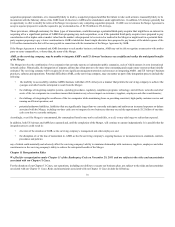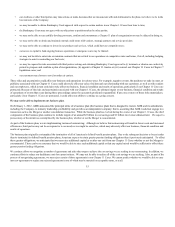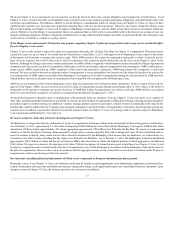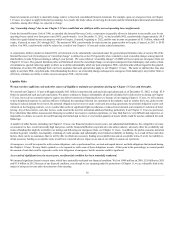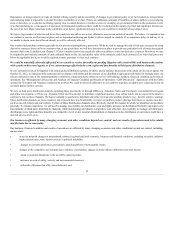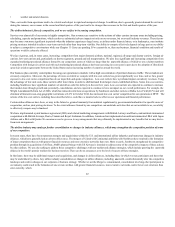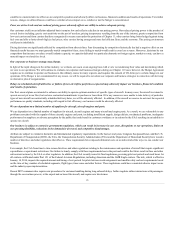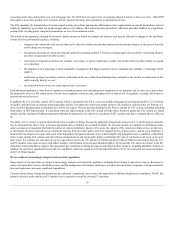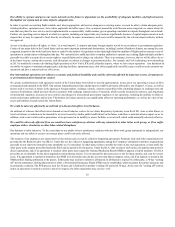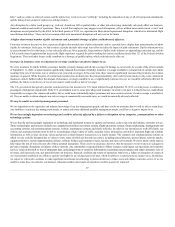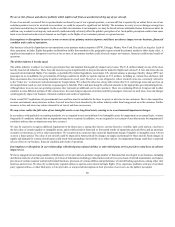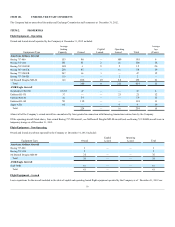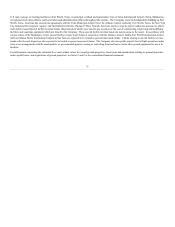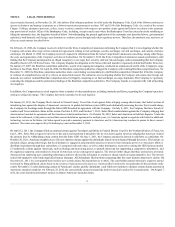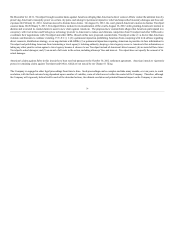American Airlines 2012 Annual Report Download - page 24
Download and view the complete annual report
Please find page 24 of the 2012 American Airlines annual report below. You can navigate through the pages in the report by either clicking on the pages listed below, or by using the keyword search tool below to find specific information within the annual report.
concerning airline fares and ancillary fees such as baggage fees. The DOT has been aggressively investigating alleged violations of these new rules. Other DOT
rules apply to post-ticket purchase price increases and an expansion of tarmac delay regulations to international carriers.
The TSA mandates the federalization of certain airport security procedures and imposes additional security requirements on airports and airlines, most of
which are funded by a per-ticket tax on passengers and a tax on airlines. TSA airport security procedures, which are generally disliked by a significant
portion of the traveling public, dampen the demand for air travel to an unknown extent.
The results of our operations, demand for air travel, and the manner in which we conduct our business each may be affected by changes in law and future
actions taken by governmental agencies, including:
•changes in law which affect the services that can be offered by airlines in particular markets and at particular airports, or the types of fees that
can be charged to passengers;
•the granting and timing of certain governmental approvals (including antitrust or foreign government approvals) needed for codesharing alliances
and other arrangements with other airlines;
•restrictions on competitive practices (for example, court orders, or agency regulations or orders, that would curtail an airline's ability to respond
to a competitor);
•the adoption of new passenger security standards or regulations that impact customer service standards (for example, a “passenger bill of
rights”);
•restrictions on airport operations, such as restrictions on the use of takeoff and landing slots at airports or the auction or reallocation of slot
rights currently held by us; and
•the adoption of more restrictive locally imposed noise restrictions.
Each additional regulation or other form of regulatory oversight increases costs and adds greater complexity to our operation and, in some cases, may reduce
the demand for air travel. We cannot assure investors that compliance with new rules, anticipated rules or other forms of regulatory oversight will not have a
material adverse effect on us.
In addition, the U.S. air traffic control (ATC) system, which is operated by the FAA, is not successfully managing the growing demand for U.S. air travel.
Air traffic controllers rely on outdated technologies that routinely overwhelm the system and compel airlines to fly inefficient, indirect routes. On February 14,
2012, the FAA Modernization and Reform Act of 2012 was signed. The law provides funding for the FAA to rebuild its ATC system, including switching
from radar to a GPS based system. It is uncertain when any improvements to the ATC system will take effect. Failure to update the ATC system in a timely
manner, and the substantial funding requirements that may be imposed on air carriers of a modernized ATC system, may have a material adverse effect on
us.
The ability of U.S. carriers to operate international routes is subject to change because the applicable arrangements between the U.S. and foreign governments
may be amended from time to time, or because appropriate slots or facilities are not made available. We currently operate on a number of international routes
under government arrangements that limit the number of carriers permitted to operate on the route, the capacity of the carriers providing services on the route,
or the number of carriers allowed access to particular airports. If an open skies policy were to be adopted for any of these routes, such an event could have a
material adverse impact on us and could result in the impairment of material amounts of our related tangible and intangible assets. In addition, competition
from revenue-sharing joint ventures and other alliance arrangements by and among other airlines could impair the value of our business and assets on the open
skies routes. For example, the open skies air services agreement between the U.S. and the EU which took effect in March 2008 provides airlines from the U.S.
and EU member states open access to each other's markets, with freedom of pricing and unlimited rights to fly beyond the U.S. and to any airport in the EU
including London's Heathrow Airport. The agreement has resulted in us facing increased competition in these markets, including Heathrow Airport. In
addition, the open skies agreement between the U.S. and Brazil, which was signed in 2010 and takes full effect in 2015, has resulted in increased competition
in the U.S./Brazil market.
We are subject to increasingly stringent environmental regulations
Many aspects of our operations are subject to increasingly stringent environmental regulations, including those relating to emissions to the air, discharges to
surface and subsurface waters, safe drinking water, and the management of hazardous substances, oils and waste materials. Compliance with environmental
laws and regulations can require significant expenditures.
Concerns about climate change and greenhouse gas emissions, in particular, may result in the imposition of additional legislation or regulation. The EU has
adopted a directive under which each EU member state is required to extend the existing EU emissions
24


